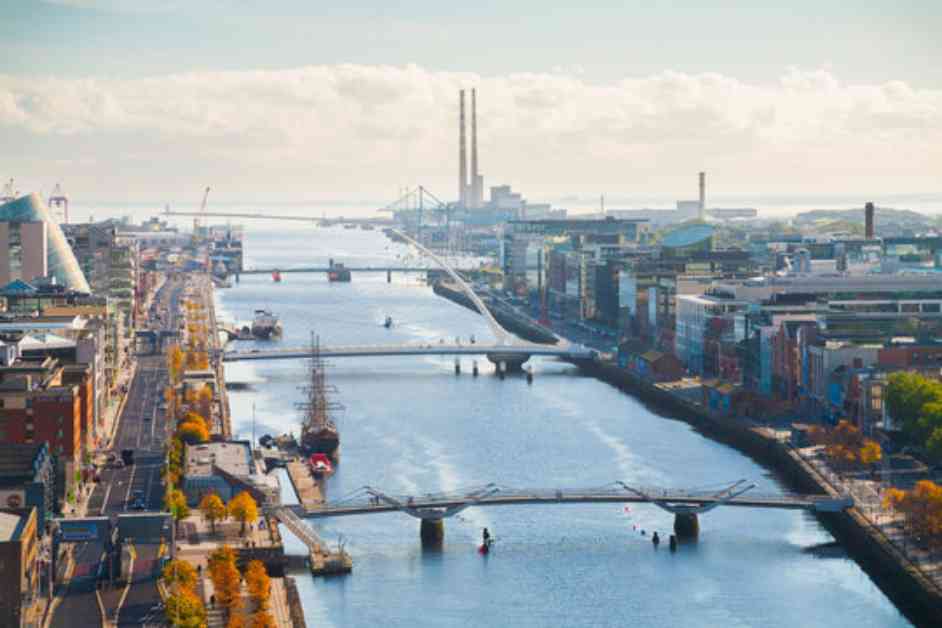Dublin Chamber has raised concerns about the investment gap that threatens the economic growth of Dublin. The chamber has urged the government to prioritize increasing investment in major capital projects such as public transport, water infrastructure, energy, and housing in the upcoming Budget 2025.
Mary Rose Burke, CEO of Dublin Chamber, emphasized the importance of addressing the housing shortage in the Greater Dublin Area (GDA). She highlighted that the lack of affordable housing is a significant barrier to recruitment and retention for businesses in the region. Burke stressed the need to increase the supply of homes in the GDA to meet the needs of residents, businesses, and investors.
One of the key suggestions put forward by Dublin Chamber is the review of the Residential Zone Land Tax to incentivize the activation of more zoned and serviced land for housing development. Burke emphasized the importance of ensuring that areas designated for residential development are equipped with essential infrastructure such as water, wastewater, public transport, energy, and childcare to prevent delays in housing delivery.
The chamber also highlighted the impact of delays in major capital investment projects on Dublin’s progress. Projects such as Uisce Eireann’s Eastern and Midlands Water Supply Project, the Greater Dublin Drainage Scheme, Metro, DART+, and Busconnects are crucial for the city’s development. Dublin Chamber called for a revision of the Housing for All target to ensure the delivery of a minimum of 53,000 housing units per year, with half of them being allocated within the GDA.
Childcare access was identified as a critical factor in the planning of capital investment delivery. Dublin Chamber recommended a further reduction in the cost of childcare by increasing the universal subsidy under the National Childcare Scheme. The chamber also emphasized the importance of developing more childcare facilities and increasing capacity to support working families in the region.
Burke emphasized that the government’s significant tax revenue should be utilized to invest in the future through major capital projects that will yield long-term benefits for the city. Dublin Chamber stressed the importance of sustained investment in infrastructure to support economic growth and development in Dublin.
Challenges in Dublin’s Economic Growth
Dublin’s economic growth is facing significant challenges due to the investment gap in key areas such as housing, public transport, water infrastructure, energy, and childcare. The lack of affordable housing in the GDA is a major concern for businesses, residents, and investors. The housing shortage has led to recruitment and retention difficulties for companies operating in the region, hindering overall economic progress.
The inadequate investment in essential infrastructure projects such as the Eastern and Midlands Water Supply Project, the Greater Dublin Drainage Scheme, Metro, DART+, and Busconnects is causing delays in critical developments. These projects are vital for improving the city’s connectivity, sustainability, and overall quality of life. Without sufficient investment in infrastructure, Dublin’s economic growth and competitiveness could be at risk.
Opportunities for Investment and Development
Dublin Chamber’s pre-budget submission highlights key opportunities for investment and development that could drive economic growth in the city. By increasing investment in major capital projects, the government can create jobs, improve infrastructure, and stimulate economic activity. Enhancing the supply of homes in the GDA, reviewing the Residential Zone Land Tax, and ensuring access to essential services like water, wastewater, and public transport are crucial steps towards addressing Dublin’s investment gap.
Investing in childcare facilities and reducing the cost of childcare through the National Childcare Scheme can support working families and contribute to a more inclusive economy. By leveraging the city’s tax revenue to fund strategic infrastructure projects, the government can lay the foundation for sustainable growth and prosperity in Dublin. The opportunities for investment and development in the city are vast, and with the right strategies in place, Dublin can overcome its current challenges and emerge as a thriving hub of innovation and opportunity.
Conclusion
In conclusion, Dublin’s economic growth is at a critical juncture, with the investment gap posing a significant threat to the city’s development. By prioritizing investment in key areas such as housing, public transport, water infrastructure, energy, and childcare, the government can unlock the full potential of Dublin’s economy. Dublin Chamber’s recommendations provide a roadmap for sustainable growth and prosperity, emphasizing the importance of strategic investment in infrastructure to support the city’s long-term success. As Dublin prepares for Budget 2025, it is essential for policymakers to heed these calls for increased investment and accelerated delivery in major capital projects to ensure a bright and prosperous future for the city.












